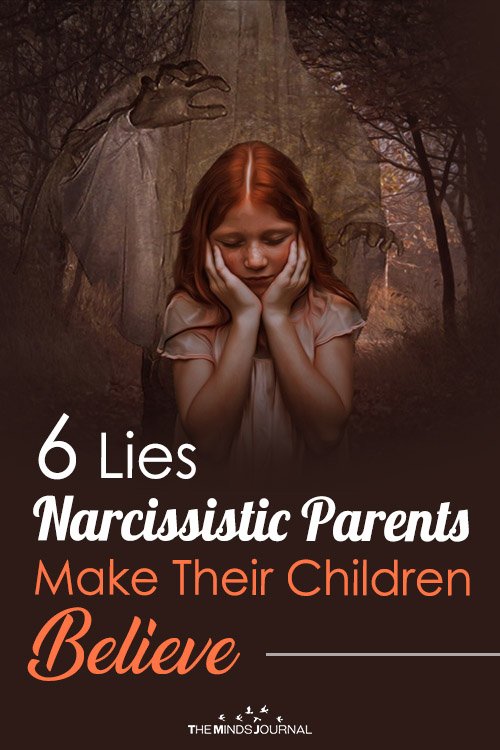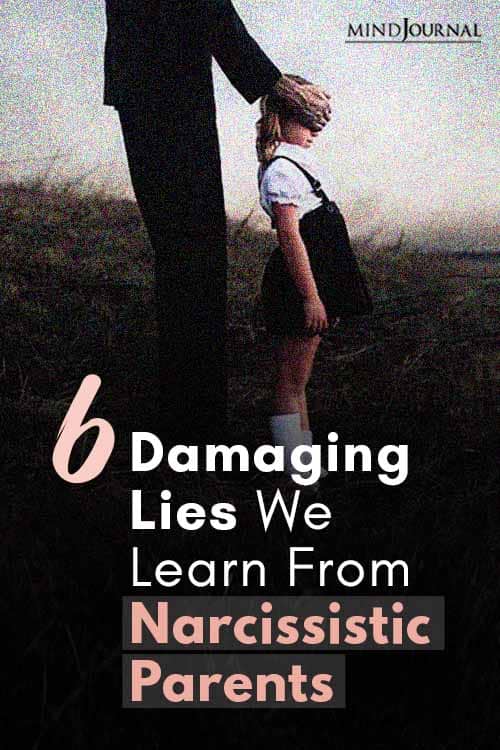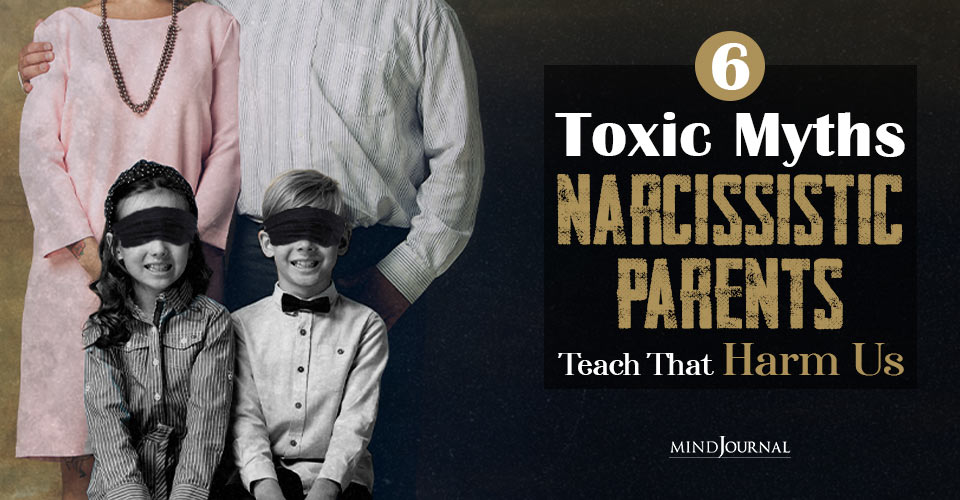Many children have the misfortune of being subjected to torturous deceit from their toxic parents. Learn the damaging lies we learn from narcissistic parents.
Narcissistic parents engage in twisting reality to meet their needs which misfires to hamper their children in the long run.
Recently in a conversation with my mother, I asked her what love means to her. I remember her sitting inside the slightly darkened cafe we had rushed into, to escape the deadly Indian summer heat, for quite a while before answering.
When she finally did, this is what she said : “When you put someone else before yourself, that’s love.”
It has stuck to my conscious mind and now that, narcissism is the central point of this piece, it’s coming back to me with a greater impact.
People with narcissistic personality disorder are often self-absorbed, self-fulfilling, and exhibits such a self-obsession at the cost of others, that the world around them often crumbles.
The behavior is often exacerbated when such a person becomes a parent. A narcissistic parent often sends their child into a volley of psychological issues that stem essentially from the chaos of not knowing what’s true and what they can believe in.
An unsafe, conditional relationship between such a parent and their child leads to long-term reverberations for the latter, as they grow up and begin to integrate themselves with the world.
What’s perhaps most damaging about a child (and even those who have outgrown that developmental stage) who’s caught in a narcissistic equation, is the perception they develop about themselves. For the fact is that most of what they are told and made to believe come from a narrowed understanding and experience for the narcissistic parent.
And if you’re wondering what the most common ones are, here’s a list.
Here Are 6 Damaging Lies We Learn From Narcissistic Parents
1. “You’re not good enough”.
In a healthy parent-child relationship scenario, the parent plays the part of instilling self-love and self-worth in the child.
In a relationship where the parent is narcissistic, this aspect goes largely missing, for the simple reason that such parents are incapable of emotional holding or connection. Power and attention are all that they are interested in.
This means that they can send across the “you’re not good enough” message both subtly and loudly. Either way, the child feels like they lack worth inherently and can never match up to anyone, let alone chase their dreams. The message can play out where the parent pits the child against their friends, their siblings, or even children seen on TV shows.
The expectations set are unrealistic and the child is somehow made to believe that these standards are natural and that they should meet them to earn the minimum recognition in their parent’s eyes.
Related: 30 Ways In Which Narcissistic Parenting Affects A Child
2. “You’re not supposed to feel what you feel.”
Power and feeling powerful are two themes constantly running in a narcissist’s life.
So, even as a parent, such a person focuses on voicing their needs and valuing their own opinions. Even if they come at the cost of the individuality that should ideally develop in their child.
Narcissists have a way of quietening down feelings that are not their own and making their children feel guilty of any emotion or feeling that they don’t approve of.
This voicelessness spreads in time and as the child grows, they might believe increasingly that what they feel is not valid.
3. “You must win at all cost”.
Continuing with the power theme, narcissism also has roots in competition.
Or shall we say, unhealthy competition?
For we all know that competition by itself isn’t a terrible thing. If one has to be in the game (equate that with life, education, work, sport, etc.), one has to be able to compete. But what makes competition an almost destructive word when viewed as narcissism, is its power to put the focus on the competition rather than the game.
This means that a narcissistic parent will pit one sibling against another, trigger their child to compete against friends (even if that means underhanded means).
These parents end up sending the message that manipulation is “cool” and must be resorted to if all other means to winning fail.
Related: Six Kinds of Emotional Abuse by Narcissistic Parents
4. “You must never feel good about successes”.
Why? Because there’s always more to be done.
That’s one of the classic messages a narcissist delivers, either through covert or overt means.
Be it a narcissist lover or a narcissist parent, maintaining the illusion that the victim is always beneath their achievements, is of paramount importance. When you think about it, you’ll know that’s the one surefire way for them to maintain control.
For a narcissist parent, it’s essential that the child achieves success on the terms they define.
When that does not happen, the child can be insulted, exposed to violent behavior, or even be subjected to cold neglect. In a narcissist parent’s universe, the grandiosity of plans and achievements has more priority than their child’s well-being.
5. “Your worthiness is outside of you, so find it”.
Success, power, money, fame, and the list goes, when one translates the expectations that a narcissist parent has from their child (Yes, even if they are not that small anymore).
A sense of worth is associated with being the best in class, best at work, best in the eyes of society. The grandiosity mentioned in the previous point translates into this messaging, often subtle and insidious. A compulsive need to prove themselves is what the offspring of a narcissist is left with.
To feel just an iota of worth, they may chase a career they have no interest in, form alliances with people they don’t gel with, and pursue a life that’s far from what they really want.
6. “You don’t know enough for your own good”.
If you’re wondering what the corollary for that is, it is: “let me tell you.” This is another usual symptom of a narcissist parent slipping control into their children’s lives.
From telling them how to dress up to dictate what they ought to eat to who they should spend time with, it might seem to a narcissist’s child that they don’t know enough.
This is again something that feeds the power equation and might make the child think that the parent’s knowledge or understanding must not be questioned at all.
Related: How To Save Children From Narcissistic Abuse and Toxicity
Do you notice a theme running through every little misconception (passed off as the word of God of course) above?
Each of them plays with the aspect of self-esteem and prevents the child from individuating into an adult of their own choice and making (holds true even for those children who are adults but who continue to be in the throes of old patterns).
If the above ring a bell, it’s perhaps time that you sit yourself down and evaluate the relationship you share with your narcissistic parent. In the process, renegotiate boundaries and call back everything (feelings, voices, to-do lists) that seem rightfully yours.
If you want to know more about the lies we learn from narcissistic parents, then check this video out below:











Leave a Reply